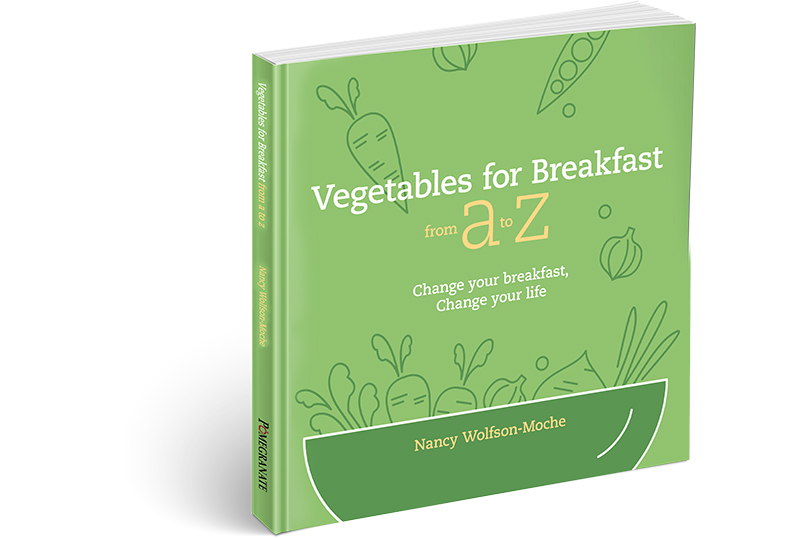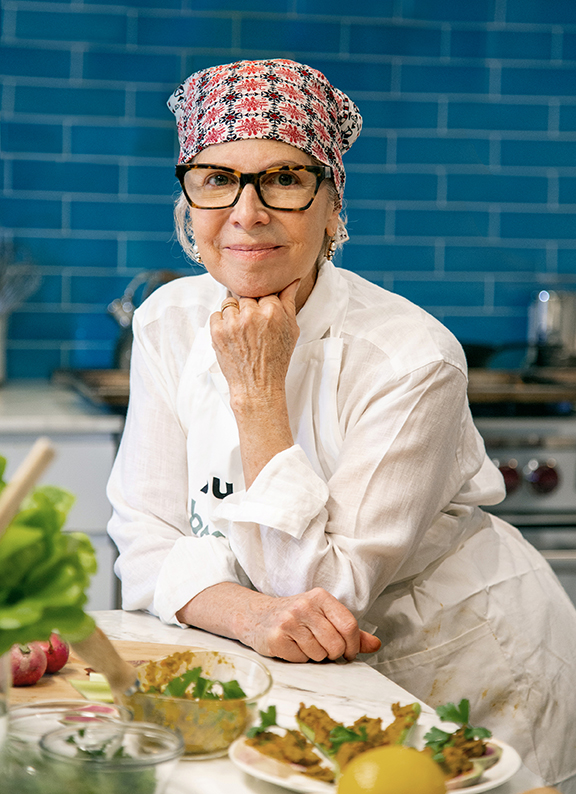
By Stacey Dresner
Nancy Wolfson-Moche wants to shake up the way we see breakfast.
In her new book, Vegetables for Breakfast, from A to Z, which comes out this month, the nourishment counselor, writer, blogger and food educator says that a breakfast that contains a whole grain food and a vegetable every day “can transform one’s digestion, consciousness, and very life.”
And the vegetable dishes she suggests are not of the mushroom and green pepper three-egg omelet variety many might envision.
Wolfson-Moche starts her book with Asparagus Almondine and ends with Zinguini – zucchini noodles sautéed in extra virgin olive oil and tekka, a Japanese powdered condiment made of roasted root vegetables.
In between, her recipes include offerings like Spicy Brussel Sprouts, Purple Daikon Corn Salad, Chopped Kale with Pine Nuts, Green Sashimi, made with green beans wrapped in carrot peelings, and Onions and Shitake on a Tofu Pad. Breakfast veggie dishes are paired with side dishes or “go withs” of grains like millet, barley risotto, rice, polenta, even steamed sour dough bread.
Wolfson-Moche, who lives with her family in Cornwall, Conn., has been eating vegetables for breakfast since she experienced difficulty getting pregnant in her 40s. Told that she was “beyond childbearing age” and not a candidate for high-tech fertility treatments, she tried more holistic avenues like acupuncture, yoga, Chinese herbs, rapid eye movement therapy, macrobiotics and more.

Through the advice of a macrobiotic counselor, she began making home-cooked meals of whole grains, vegetables and plant proteins, and sitting down to eat them on a regular schedule with her husband.
Not only did she soon conceive her first daughter, she also saw improvements in her digestive health and gained more energy, unintentionally losing 10 pounds. Continuing with this dietary change, she conceived her second daughter six years later and has continued to eat this way because of its benefits to her health.
Born and raised in Edgemont, a town in Westchester County, N.Y., Wolfson-Moche credits her mother, Harriet Wolfson, for sparking her love of cooking. But not in the way you might think.
“I dedicated the book to my mother because my mother never cooked, still doesn’t cook, and thanks to that she allowed me into the kitchen at a very early age and let me do a lot of cooking,” she said. “I think it was one of those situations where the lack of interest in my mother sparked a great curiosity in myself. I’m grateful for her for giving me that space.”
Both of her parents came from observant Jewish families but had over the years become Reform. Her family attended Temple Israel, a synagogue in New Rochelle.
“I grew up with a very Reform experience, but very much like my experience in the kitchen, I was the kid who came home from Hebrew school and said, ‘Why don’t we have a sukkah? Why aren’t we celebrating Tu B’Shevat?’” she recalled. “I grew really curious about all of those holidays that we didn’t celebrate. We celebrated the Rosh Hashana, Yom Kippur, and Pesach, and Chanukah, and I grew really curious about the others. So once I left home I just became a real learner, curious about Jewish tradition.”
After graduating from Trinity College in Hartford, where she double majored in Italian literature and political science, and attending the Johns Hopkins School of Advanced International Studies, she moved to New York City and joined a Conservative synagogue where she learned to read Torah.
“I just became more and more immersed, but feeling like I had lost a lot of time. In the end I feel that was a huge gift; to have come to prayer and Torah later in life so that it’s never rote for me.”
Wolfson-Moche worked for more than 20 years as a journalist on lifestyle magazines like Glamour, then spent several years living in Italy – a country she says had influenced her ideas about food as a child.
“I spent a summer in Italy when I was 13. It was really a transformative time for me in many ways…One thing that happened to me that summer was a whole new approach to eating and cooking that I developed.
“I ended up spending about 12 more years of my life in Italy, in which time I went to several cooking schools there as a journalist and I really developed an appreciation for whole food and fresh ingredients. In those years in Italy you couldn’t get any thing any time. Everything was fairly local. So I learned to cook that way, seasonally and locally.”
After marrying at the age of 42 and experiencing infertility, one of the people she turned to was noted macrobiotic counselor Denny Waxman who helped to fine tune her diet.
“My diet was pretty much the standard American diet and if you look at that acronym, it’s S.A.D.,” she says. “And it was pretty sad. I thought I was eating a relatively healthy diet because I was eating a lot of fresh fruits and vegetables, but I discovered soon after I began practicing macrobiotics that actually I had IBS, Irritable Bowel Syndrome, and I had had it for a long time. I just thought that’s what happened when you ate; you got bloated and uncomfortable because I was so used to living that way.”
She had visited Waxman in the past to help deal with other health conditions, including fibroids. “He gave me recommendations, and in all honesty, I followed maybe 70 percent of them and they totally worked.”
Her fibroids disappeared in a month after only partially following the macrobiotic diet.
“So I had a lot of faith in his method. But this time I was so invested in wanting to have a child, and I felt that my time was so short that I followed 100 percent of the recommendations,” Wolfson-Moche explained.
The recommendations for fertility were not just about what to eat and what not to eat – “Basically the diet is more about how you eat than what you eat,” she said. “The key is sitting down to three regular meals a day at regular times, chewing your food really well, eating a whole grain – not a refined grain – and a separate vegetable dish with each meal. And as I say in the book, the separate vegetable dish can be a raw carrot or a pickle.”
She stressed that everyone is different and that Waxman looked at her individually when coming up with her diet plan.
“In my case, for example, I had been eating a lot of bread. I am a lover of bread, and still am a break love, so I really needed to cut back on that. But somebody else might have different specific recommendations”
She was also warned to stop eating eggs, which she says are acidic.
“I discovered so many things beyond my goals which were to get pregnant and have a child. I discovered that my body felt more balanced and lighter and cleaner…My energy level was better. My mind was sharper.”
Once her daughter was born, she realized she needed the energy the food plan gave her.
“Initially I said, ‘Once I get pregnant and I have the baby I’ll just go back to eating the way I used to eat, and once she was born I realized that I actually needed more energy than ever before and more sharpness in my brain.”
Staying on the diet, she was able to conceive her second daughter six years later at the age of 51.
In the past few years, Wolfson-Moche has continued to eat this way.
She says she is a pescatarian (eats fish), and while she prepares vegetables, whole grain and plant protein meals at home – “I’ve got a family that is not onboard with veganism and it’s really important to honor everybody’s preferences. I eat mostly vegan myself, but as a family we don’t.”
Wolfson-Moche, now a certified macrobiotic counselor and culinary medicine practitioner, founded You Are Because You Eat, an organization offering cooking classes and workshops for children, afterschool programming, menu planning and nourishment counseling. After writing a blog Vegetable for Breakfast (youarewhatyoueat.com/blog) and chronicling the vegetable’s she made for herself and family for a year, she decided to write the book.
“It’s pretty easy to eat a vegetable at lunch and dinner, but breakfast was a big leap because, first of all I spent 12 years in Italy where breakfast is a cappuccino and a cornetto – a more savory version of a croissant with less butter. But still, it’s basically a sweet and coffee.
So the vegetable for breakfast was really challenging because it wasn’t something I was used to.”
But she came up a variety of simple vegan dishes perfect for breakfast. Blanched, sautéed, steamed and raw fresh vegetables, with interesting accent flavors – fruit, lemon juice, pomegranate seeds, turmeric, ginger, sumac and edible flowers.
Foods from other cultures are also highlighted. She includes Japanese tekka and nori in recipes, a nod to her husband, an Iraqi Jew who was raised in Kobe, Japan. Jewish and Middle Eastern foods are also accounted for: Dolamades, Italian Parsely Edamame Hummas, Quinoa Tabloueh, Fatoush, and Jerusalem Artichoke, Parsnip and Fennell Pancakes, Wolfson-Moche’s version of a latke.
Taking her readers through the recipes, Wolfson-Moche lists ingredients and instructions, but also includes information about the foods – Did you know fennel is a cousin to the carrot? – as well as their origin and nutritional value. She mixes in sections like “Chew More, Eat Less” encouraging readers to eat slowly and mindfully. She even includes a Jewish folktale about the importance of eating with gratitude.
Wolfson-Moche says eating vegetables for breakfast “frames you day, establishing its rhythm and tone.”
“What eating vegetables for breakfast does is, it really kind of sets up you palate for the rest of the day,” she explained. “If you eat a really sweet breakfast, which can be anything from pastry to pancakes with bananas and maple syrup, you’re setting yourself up to crave sweets for the rest of the day. Whereas, if you eat more a balanced breakfast with a range of different flavors you setting yourself up to crave those flavors. And that’s I think how change really happens.”







 Southern New England Jewish Ledger
Southern New England Jewish Ledger














